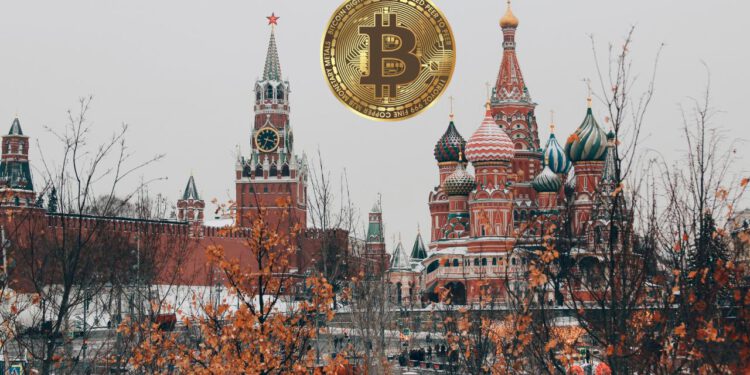Russia is one of the most influential countries on Earth and at the same time one of the most controversial nations on the world stage. Economically, Russia does not have the status that it has militarily. Nevertheless, one should not disregard economic developments in the country. For example, Russia has always been critical of Bitcoin and other cryptocurrencies in recent years.
In recent days, a new law has been signed in Russia that prohibits the use of cryptocurrencies such as Bitcoin as a means of payment. What is the impact of the ban and the renewed strong restriction of cryptocurrencies in an important country like Russia?
In this article, we will discuss what a new ban in Russia is and what the new ban may have an impact on the rest of the world.
How does Russia feel about Bitcoin?
The relationship of Russia with Bitcoin and other cryptocurrencies has been marked by many difficulties in recent years. While Bitcoin is widely accepted as a means of payment in Europe and the USA and there have been few restrictions so far, Russia is one of the countries that has restricted cryptocurrencies more in the past.
In the past, Russia has been one of the strictest countries when it comes to cryptocurrency restrictions. True, Bitcoin was not completely banned in Russia, as is the case, for example, in China. However, there have been massive restrictions in the past that prevented cryptocurrency trading in Russia.
Is Bitcoin completely banned in Russia?
The Bitcoin is extremely limited in Russia when it comes to the possibility as a means of payment. But a complete ban on Bitcoin does not yet exist in Russia. However, Russia is probably the European country that has the strongest restrictions on Bitcoin and cryptocurrencies.
There are many countries in the world that have completely banned Bitcoin. In these countries, the possession and trading of the cryptocurrency is punishable by law. In this article, we have compiled a list of countries where Bitcoin is illegal. Here, religious reasons or the fight against terrorism and crime are often cited as the reason for the ban.
What does the new law say in Russia?
On July 14, Russian President Vladimir Putin signed a law that completely prohibits the use of bitcoin as a means of payment in Russia. The specific ban applies to the use of digital financial assets (DFAs) and utilitarian digital rights (UDRs).
The law states that it is forbidden to exchange digital financial assets for goods, works and services in return. As a result, the complete trading of cryptocurrencies such as Bitcoin in Russia is prohibited in principle.
Furthermore, the new legislation obliges crypto exchanges to prevent and reject all possible transactions, in where DFAs or UDRs could be used. The exchanges must ensure that users do not use cryptocurrencies such as Bitcoin in Russia as a means of payment for goods and services.
Is there a threat of a complete ban on Bitcoin in Russia in the future?
In recent months and years, Bitcoin has repeatedly seemed to be on the verge of a ban in Russia. For example, the Russian central bank, which has control over the ruble, has repeatedly called for a complete ban on Bitcoin in recent years. Central banks, by their very nature, are not good at talking about decentralized currencies like Bitcoin. In an authoritarian country like Russia, these views are usually even more extreme.
Recently, however, the attitude of the Central Bank in Russia seemed to change. The Russian Minister of Industry and Trade Denis Manturov last hinted in May that Bitcoin and other cryptocurrencies would be legalized as a means of payment in Russia in the future. Later it was reported that the Russian Central Bank was ready to allow cryptocurrencies for international payments.
So there seems to be a certain rethinking taking place in Russia. On the one hand, the new law could be a step backwards for possible liberalization plans for Bitcoin in Russia. However, this law could also provide a framework for what might be allowed in Russia in the future when it comes to cryptocurrencies.
Why is Russia skeptical about Bitcoin and cryptocurrencies?
Russia is considered an authoritarian country with a large concentration of power in the hands of a few individuals. Cryptocurrencies are always a big problem for authoritarian systems. We can observe this most strongly in China, where in recent years there have been increasingly severe restrictions and bans.
Above all, Russia wants to keep its own financial system stable around the ruble and not let any competition arise. The intertwining of politics and rich oligarchs contributes to this. Russia is considered one of the most corrupt countries in the world. A decentralized currency is therefore not welcome by the political elite.
What are the implications of the new restrictions in Russia for the future?
The new law banning cryptocurrencies such as Bitcoin as a means of payment in Russia once again shows how strongly many states are fighting against Bitcoin as an alternative means of payment. But so far, in the past, we have repeatedly been able to point the finger at authoritarian states such as China and Russia when it came to restrictions and bans on Bitcoins.
However, in the recent past, this is no longer the case only in these states. The US and the EU have also recently shown increasingly authoritarian approaches when it comes to dealing with Bitcoin and other cryptocurrencies. The EU even wanted to ban Bitcoin mining, which is said to be extremely environmentally harmful. But there are also legislative proposals in the USA that could massively regulate Bitcoin.
The Western states seem to be drifting more and more in a more authoritarian direction when it comes to Bitcoin and other cryptos. At the same time, Bitcoin should continue to be much more “unfree” in Russia than in Western democracies. But the new ban in Russia has now been an extended, massive restriction for Bitcoin in a very influential country. But in the future, even in Western countries, more authoritarian steps on the subject of Bitcoin could follow.









